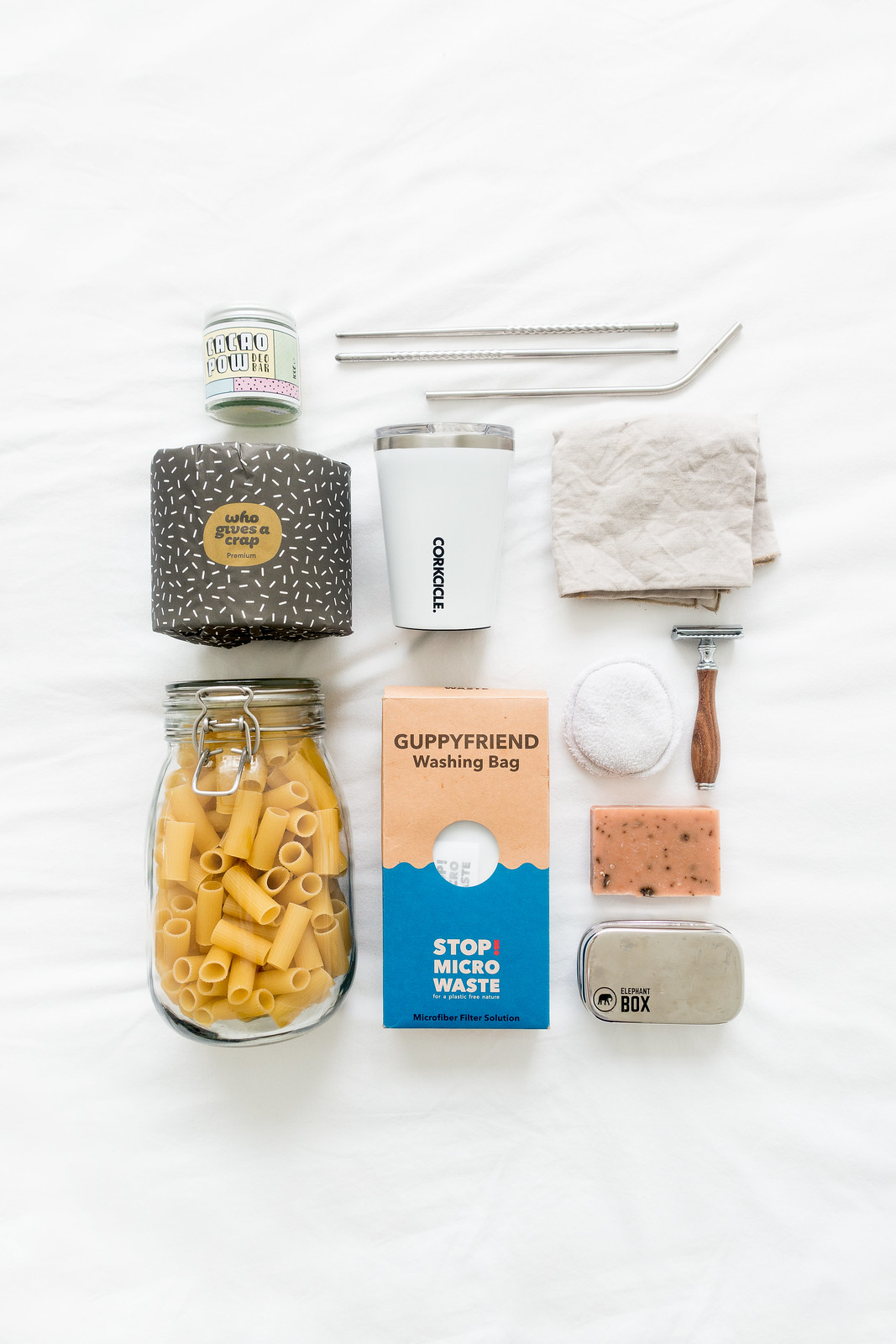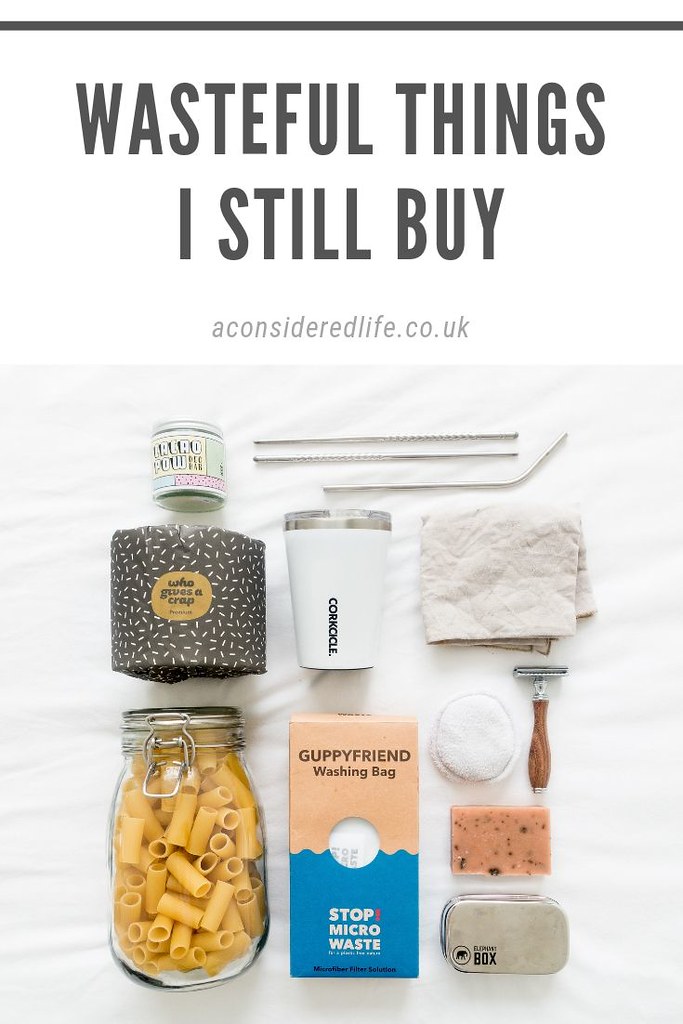
Try as we might to reach zero waste, it's impossible. It's a catchy term that isn't very helpful. Focusing on “zero waste” means prioritising personal waste but from a sustainability perspective, there are more important things to worry about. Living plastic-free isn't my top priority, living a more sustainable and compassionate life is.
What you have to bear in mind when making decisions about the low waste habit shifts you choose to make is: how much does this affect my life, how much of an impact does it have on the planet, and how much waste am I really reducing? You have to consider whether the time, effort, and convenience you have to sacrifice in order to make the switch is worthwhile in terms of the result it produces.
There are lots of wasteful things we don't need and could go without. We could make things from scratch, boycott plastic-wrapped goods, and only buy locally grown produce. But all those things rely heavily on privilege; the privilege of time, convenience, access, and money. There's only so much we can do before one or all of those things get stretched beyond our means; and if it barely reduces waste, is it really worth it?
I don't believe it's down to us as individuals to shoulder the responsibility for how things are packaged and sold to us. We must take responsibility for the habits we can change but we shouldn't feel guilty about the things we can't. Not buying things in plastic is a great way to reduce personal waste but that doesn't stop other people buying them, and it doesn't always equal better for the environment. Write to your local council, supermarkets, and online retailers; put pressure on them and demand change. It's more effective than boycotting plastic-wrapped cucumbers.
I prefer to focus on changes that have a big impact rather than the smaller, less impactful ones. These are the wasteful things I buy, and will continue to buy, until I find an affordable, convenient, and realistic solution. (Just a polite note: I'm not looking for recommendations, suggestions, or alternatives to the following items; I buy them for a reason.)

Personal Care
Something I consider to be off limits when it comes to zero waste living is medicine, dental hygiene, sun protection, and anything else that directly affects a person's health. DIYing toothpaste has its risks, sunscreen is important, and medication is essential. I buy supplements, pain killers, sun screen, and dental items that all involve some form of packaging and even plastic. My health isn't something I would ever compromise for zero waste. I make switches when it's safe and effective to do so, otherwise I don't worry over it.
Treats
I make a lot of my own cookies and brownie bites (recipe in my Low Waste Plant-Based Cookbook) or simply go without. But occasionally I like to indulge in my favourite packaged snacks. Crisps are super expensive to buy at my local bulk store so once every couple of weeks I'll buy a large bag to share with my partner. Chocolate is another snack I buy, to eat and to cook with, although this tends to be available in recyclable foil and cardboard. These are items I could go without but choose not to and instead write to the brands asking them to make changes to their packaging.
Cucumbers
There's a couple of food items that are virtually impossible to find packaging-free, and for good reasons. Cucumbers are one of them. Cucumbers are often wrapped in plastic packaging because it extends their shelf-life from 2 to 3 days up to 14 days or more, which means less food is wasted. Food waste has a far greater impact on the environment than any packaging so it's important to acknowledge why plastic is used to preserve food in this way. The only cucumbers I can find free from plastic are at my local bulk store, which sells them at an extortionate price and you know why? Because they rot faster. I'm aware of a chain supermarket that occasionally sells plastic-free cucumbers but there isn't a store close to where I live. My options are: go without or buy in plastic.
Tofu
It's possible to make tofu at home although it's quite a lengthy process if you want to avoid waste. I'd have to make soy milk first (to avoid non-recyclable packaging) in order to then make the tofu. The whole process would take a couple of hours at least. Considering I make almost everything I eat from scratch already and don't want to spend all my spare time making food, it's not realistic or convenient to make tofu and it's not always the most efficient method since it's being made on such a small scale. This is something I'm working on.
Condiments
I typically make most condiments, dressings, and spreads at home but there's a couple I don't, like sriracha, peanut butter, and tahini. It's totally possible to make these things at home (providing you have a decent blender) but that doesn't mean it's convenient or affordable. I've done the math and it doesn't add up. I also haven't yet found a recipe that gets the the flavour of sriracha just right either. Adding these condiments and spreads to my ever growing list of things I make from scratch isn't realistic, it's incredibly time consuming. I'd rather focus my energy on avoiding waste in other ways. A couple of ways I limit the packaging waste from buying these products is by opting for glass whenever possible or buying the largest bottle or tub available.
Houseplants
I love plants. Plants come in plastic pots and require compost to grow. My compost bin currently isn't producing enough compost for me to repot and tend to my plants so I buy large bags, which are plastic wrapped. Houseplants are an interest of mine that goes beyond being just a hobby, it helps my mental health and is a form of self-care. Could I ditch the houseplant hobby? Sure. Would I save much waste? No. It's yet another instance where a tiny bit of waste would be saved in exchange for a dramatic affect on my life, and I just don't think it's worth it.
Reduced Food
Zero waste isn't about personal waste. Much of the zero waste community is focused on avoiding bringing packaging into the home so they can convince us they can fit a year's worth of waste into a mason jar. Food waste is such a huge problem and an important point to focus on, much more so than packaging since it causes significantly more damage to the environment. The amount of resources that goes into producing food means that, if it's wasted, our planet suffers massively. Shopping the reduced to clear food items is a proactive way to reduce food waste, even if that means bringing plastic into your home.
Pin This Post:

